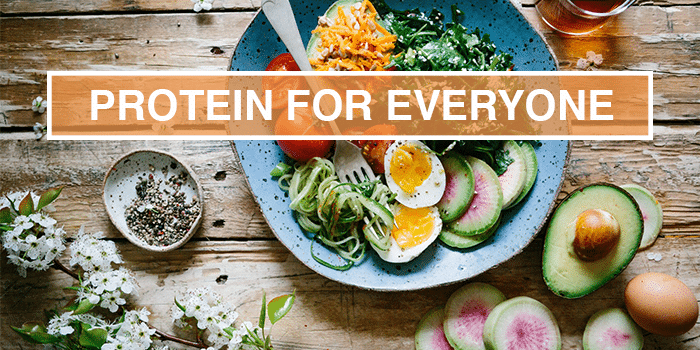 5-star Fitness
5-star Fitness
 5-star Fitness
5-star Fitness

| THE IMPORTANCE & THE MYTHS OF PROTEIN
Protein for everyone! We all need protein in our diet, but it can be difficult to know what to eat if your diet style restricts consumption of certain types of foods- like a vegan or paleo diet, for example. So, whether you follow vegan guidelines or consume all types of food, we’ve got some great suggestions for you and a little bit of information on why you need to include protein in your diet. Check it out…
Protein is an essential macronutrient. The Greek root of the word, proteos, actually means ‘primary’ or ‘important one’ because it was initially thought to be the most important of the macronutrients. That theory later evolved, as we now know that all macronutrients (protein, carbohydrate
| WHY DO WE NEED PROTEIN?
Our bodies are constantly assembling and breaking down different proteins to be used for integral roles in every single cell, each protein supporting a specific function. Some proteins act as enzymes, enabling chemical reactions to happen quickly and optimally. Some act as hormones, known as the chemical messengers of the body. Some proteins make up antibodies that help to protect us from foreign substances, other proteins maintain the fluid balance in our bodies by pumping molecules across cell membranes and attracting water, almost like a magnet. Some proteins even help balance and maintain our delicate acid-to-base ratio by picking up or giving up hydrogen ions, as needed. Many proteins transfer key substances, like oxygen, vitamins, and minerals, to specific cells throughout the body. Last, but definitely not least, proteins are used to repair and build muscle tissues and support the immune system.
We have become so evolved as a species that there are literally thousands upon thousands of different types of proteins that perform different functions within our bodies. In short, we need protein to live.
| WHERE CAN WE FIND PROTEIN?
Most people associate protein with meats or animal foods like chicken, beef, eggs, pork, and milk. While these foods are high in protein, it is less commonly know that plant foods can provide you with just as much protein, and often at a cheaper price for both your body and bank account. Plant-based proteins tend to be higher in essential vitamins and minerals and lower in overall calories, fat, and cholesterol.
There are many different diets that compliment different lifestyles, and what works for one person may not work for another. When you get down to it, what is important is that you’re getting enough nutrients from your foods to sustain and maintain a healthy life.
Here’s a look at the best protein sources for the most common diets right now…
| VEGAN PROTEIN
-The vegan diet is completely plant based and excludes meats, dairy, eggs, and honey… anything that has been taken from or created by animals. This means absolutely no animal products or by-products are ever eaten.
| VEGETARIAN PROTEIN
Vegetarian diets consist of many different sub-diets. There are lacto-ovo vegetarians, lacto-vegetarians, ovo-vegetarians, and of course vegans (listed above). Lacto-
| ANIMAL PROTEIN
Animal proteins are complete proteins, meaning they have all the essential amino acids that our body needs to obtain from food. All animals should come from their natural environment with natural feed. For example:
The Paleo Diet is based on the idea that you should only eat foods that early humans would- things you would have to hunt and gather by yourself. These foods consist of meat, fish, eggs, vegetables, nuts, seeds, and fruit. The diet excludes dairy, soy, and grains(including gluten)as they have to go through lots of processing to be considered edible. The diet also excludes any foods that have been made with artificial colors, flavors, sweeteners, or preservatives. The quality of proteins is also emphasized in a Paleo Diet.
| PROTEIN EXAMPLES:
-VEGAN:
•Almonds (¼ cup) — 8g
•Amaranth (1 cup cooked) — 8g
•Brussels Sprouts (1 cup) — 3 g
•Chia Seeds (2 tbsp) – 4g
•Farro (1 cup cooked) — 8g
•Green Peas (1 cup) — 8g
•Pumpkin Seeds (1 oz.) — 9g
•Quinoa (1 cup cooked) – 8g
•Sacha Inchi Seeds (1 oz.)— 9g of protein
•Seitan (⅓ cup) — 21g
•Sprouted Grain Bread (2 slices ) — 8g
•Teff (1 cup cooked) — 10g
•Wheat Gluten (approx. 31 g) — 23g
•Whole Wheat Pasta (1 cup) — 8g
-DAIRY:
•Cheese (1 oz) — 6–8g, depending on the type
•Greek Yogurt — 1 serving (around 170g) contains 17g of protein.
-ANIMAL:
•Chicken Breast (4oz.)— 36g
•Eggs (1 large) – 7g
•Ground Beef (70/30, 4 oz.) — 28g
•Ground Turkey (4 oz.) — 30g
•Salmon Filet (4 oz.) — 21g
•Steak (4 oz.)— 34g
Hope you found this article informative and fun! Happy eating!